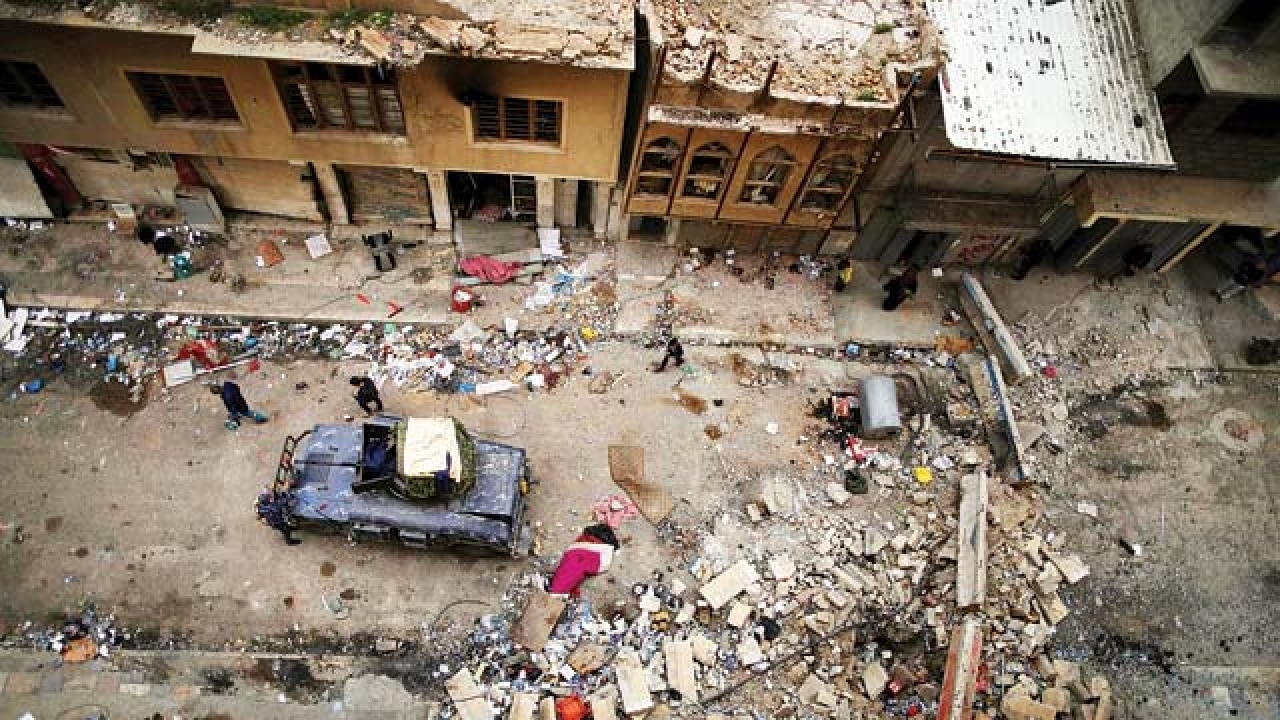
First they shot my father dead, then as we tried to get away, the sniper shot my mother. I hate Daesh, they are evil criminals,” 12-year-old Mohamed tells me. Covered in dust, his loose fitting trousers are rolled up and his flip-flops torn, all reminders of the horrors he has endured in the past few days as he fled his home in west Mosul. Mohamed recalls in graphic detail how he and his two younger brothers managed to get away, leaving the corpses of their parents behind and treading on other dead bodies.
Mosul has been reduced to rubble. For almost three years, Mohamed had lived under the brutal rule of the Islamic-State and its so called Caliphate. His parents stopped sending him to school, like so many others because of the change in curriculum once ISIS came to town. The only thing the children were being taught at school was to kill, that all other religions and sects deserved to die, and that it was for the greater-good of the caliphate and for the sake of Islam. I met Mohamed when we visited the Hamam Al-Alil camp just South of Mosul. He is now eager to learn again. Every day, he comes to the camp’s makeshift UNICEF school. He grips tightly his new schoolbag given by the aid agency.
Thousands of women, children and the elderly arrive at the camp every day, with what little they can carry. Some families walk. Others are picked up by government buses and dropped off. They may be tired, desperate and hungry but they are also relieved to have found a safe haven. According to the United Nations, more than two lakh people have been displaced since the fighting in west Mosul began in mid-February. Almost five lakh are still trapped as the operation to rid Mosul of ISIS, continues. Those still in west Mosul have two choices. If they stay they could be killed either by the US-led airstrikes or be used as human-shields by ISIS. If they try and flee, they could be killed by ISIS snipers or caught in the crossfire. Every single person we spoke to at the camp has lost family members in the fighting.
Hamam Al-Alil was one of the first cities to be targeted by the Iraqi special forces and the Coalition airstrikes. ISIS had a strong presence there. They used the former agricultural college as a court and prison. When the Iraqi military took over the city in November last year, they found a mass grave at the site with at least 100 decapitated bodies. Hamam Al-Alil is safe now but overflowing with the internally displaced. People are being asked to either go to one of the other camps or to the recently liberated east Mosul. We travelled to the East, where in January, after a bitter battle that lasted 100 days, the Jihadis were driven out.
Life is starting to return to normal in the East. The traffic is flowing again, people are coming out of their homes and the markets and restaurants are once again open for business. It is difficult to imagine though, that just a few weeks ago ISIS was beheading people in these streets.
The battle to retake west Mosul is complicated. The frontline is now in the old city and the area is densely populated. I first came to Mosul four-and-a-half years ago, when making a BBC Our World documentary. It was tense even then, with curfews and complaints from the local Sunni population that they were being mistreated by the Shia-led military. The operation is now in its final stages and there is no dispute about the outcome. Iraqi forces are determined to retake Mosul from the so-called Islamic State. But they’re fighting an enemy that is willing to fight till death. And once the fighting is over, there will be an even more complex task ahead. Reuniting a much divided city and people.
The author is a correspondent for BBC World News. She presents the channel’s daily news show Impact and regularly reports for the documentary series Our World.